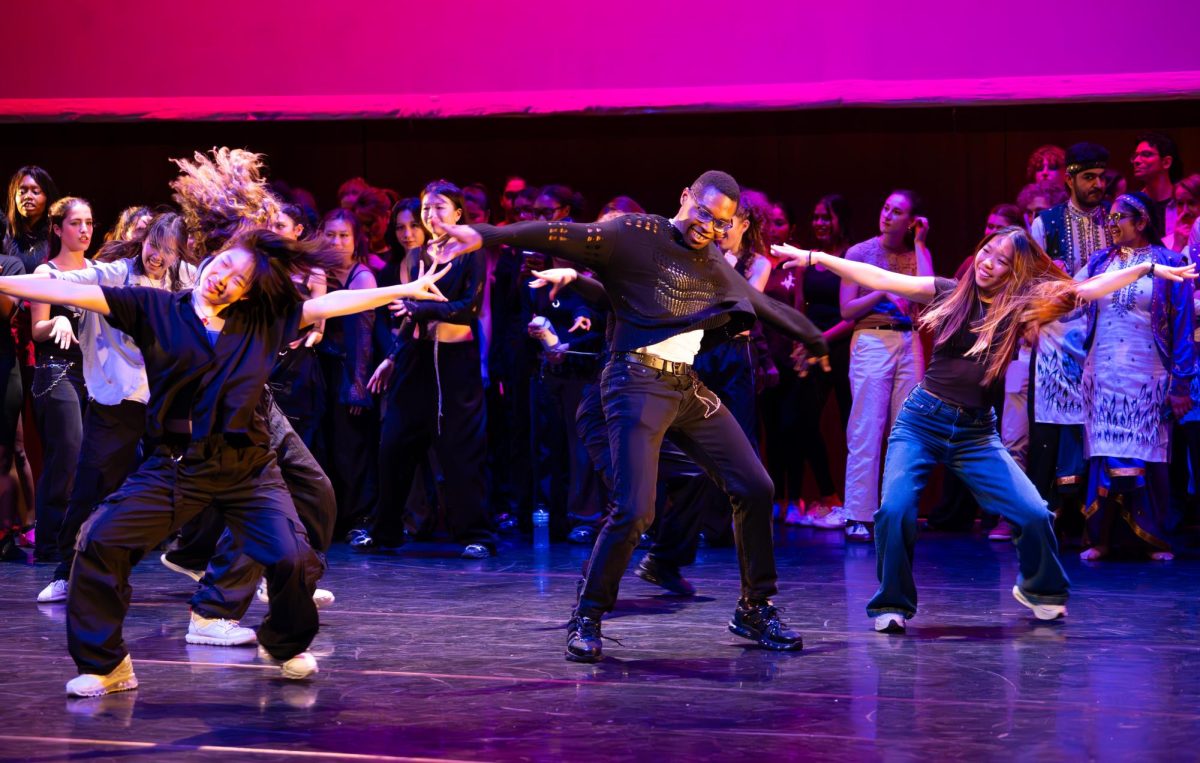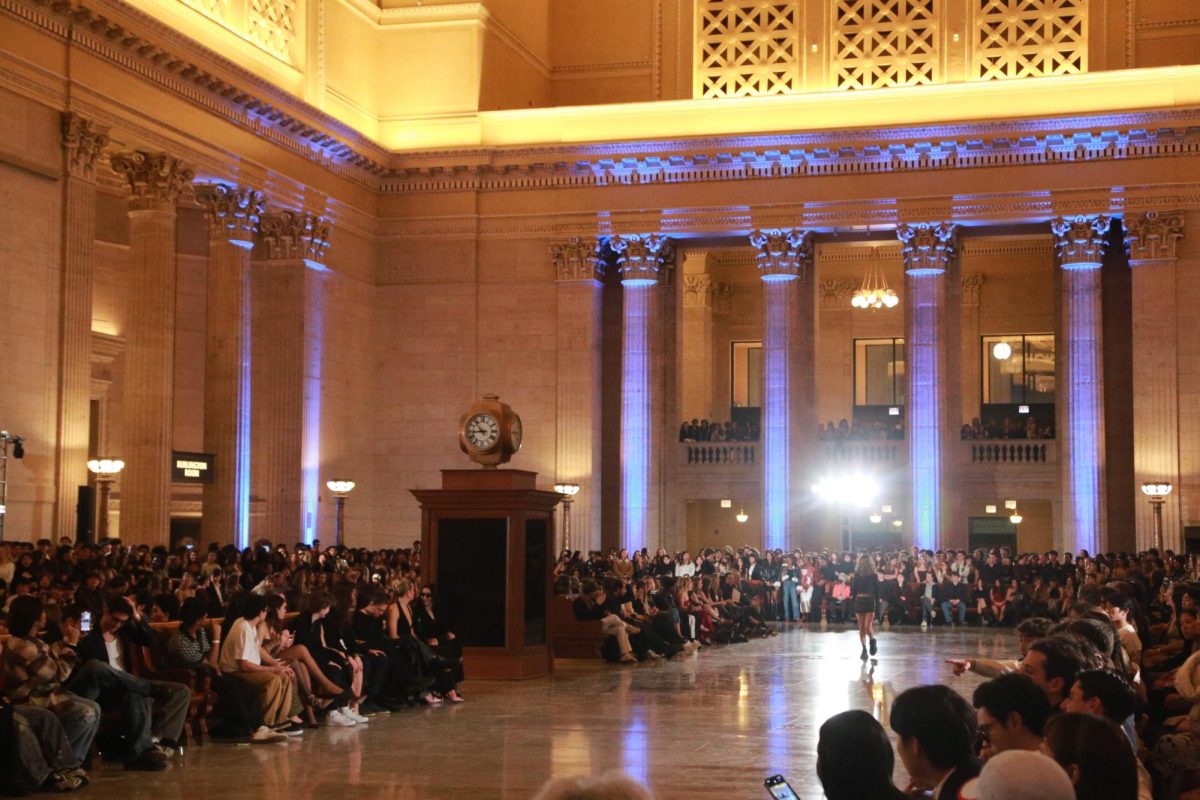Sometime during Twin Peaks’ performance of “Flavor” at Lincoln Hall, guitarist Clay Frankel grabbed his mic stand by the neck. He bench-pressed it above his head, wild-eyed and triumphant.
Twin Peaks had every reason to be elated: the Chicago group’s third album, Down in Heaven, had been released earlier that day to positive reviews. (The Lincoln Hall show was half homecoming show and half record release party.) Not that the critical reception really mattered; over its four-year career, the band has built up an enviable fan base, one that would welcome a studio recording of Twin Peaks’ fart noises with open arms.
But back to Lincoln Hall. Immediately after his Rocky Balboa moment, Frankel ran into a few problems. After almost conking a few audience members on the head with the bottom of the mic stand, Frankel managed to set it down, only to find his hand magnificently tied up in the mic cord. His frantic attempts to extricate himself set the mic stand a-wobbling, and then, like a cartoon, he toppled over and disappeared from view. The victorious mic stand was left teetering, at which point bassist Jack Dolan decided to intervene. Dolan, who was a) cross-faded and b) smirking, gave the mic stand the final push it needed to fall into the hands of the audience.
“FLAVOR YOUR HEART AND YOUR SOUL,” three other people and I howled into the mic.
By then, Frankel had untangled himself and re-emerged. He flattened his torso over the stage monitors and sang a few bars with the audience before wresting the mic back.
I tell this story not to emphasize that every member of Twin Peaks was wildly inebriated (direct quote from Frankel: “It’s hard to get drunk this early, but we tried!”), but to show how Twin Peaks thrives on spontaneity. I’ve seen Twin Peaks three times, and I’ve always walked away with an anecdote (like that time keyboardist Colin Croom got a cigarette out of the packet without ever taking his hands off the keys, or the time Croom lit a joint onstage and the band casually passed it around). Unlike bands that depend on routine to cope with the stresses of touring, Twin Peaks genuinely loves performing, and they embrace what they can’t control. In other words: when shit goes awry, Twin Peaks happily follows. And somehow—somehow—their champagne-popping, beer cup-throwing, weed-inhaling, sardine-packed, glasses-losing, drumstick-breaking spectacle at Lincoln Hall made everyone involved feel fucking fantastic.
Even when mic stands weren’t involved, the hometown audience was stoked. The third song Twin Peaks played—“Boomer,” a hooky stomper from their debut—has a guitar riff that Twin Peaks sped up just enough so that one could jump on-beat and land off-beat, repeat ad nauseum. Not jumping was simply out of the question. Lincoln Hall, a 500-capacity venue, was sold out, and so by some law of physics, the gravitational force of the jumpers sucked any non-jumpers into their upward motion.
Up and down wasn’t the only direction punters were going in, either. The band actively facilitated crowd surfers. Once, a dude trying to get a running start from the stage was unknowingly on a collision course with the neck of Dolan’s bass; Dolan saw him coming, smoothly raised his bass an inch higher, and the dude soared out into the audience without major injury. Later on, a boy clambered onstage just as the band finished “Fade Away.” Frankel put his arm around him, and gestured toward his pretend watch. The boy nodded his understanding, and waited patiently until Twin Peaks started up with “Butterfly,” at which point he did what basically amounted to a belly flop. Disoriented by 40 minutes of straight moshing, I could’ve sworn he was a giant flying squirrel. The flow of crowd surfers was steady and manageable up until the last song, “Strawberry Smoothie,” when people started going up and out at the rate of approximately one person per bar.
Of course, none of this would have mattered if Twin Peaks had sucked. If there was anything truly mind-blowing about the show, it’s that Twin Peaks still sounded good, despite the alcohol and the weed and the crazy kids and the mic cords trying to strangle them. As the band has been meticulously reminding journalists on Twitter, there are four vocalists in Twin Peaks. The alternating vocalists—James, Frankel, Dolan, and Croom—can all really sing, and the different timbres of their voices keeps things fresh. The quality of the Down in Heaven songs was an especially nice surprise; although the band has been performing “Walk to the One You Love,” for awhile now, the other six Down in Heaven tracks sat nicely alongside the rest of Twin Peaks’ catalogue as well. I would also be remiss to not acknowledge that behind every good rock band sits an even better drummer: Twin Peaks is lucky to have Connor Brodner, whose power-banging left me with ringing eardrums.
Although top tunes and drunken abandon are part and parcel of Twin Peaks, there was another element to the Lincoln Hall show: Chicago pride. Frankel big-upped the Cubs—and the Sox, “for Cadien over there”—but the best Chicago shout-out was built-in. Their 2014 song, “Good Lovin’,” features the lyric, “It’s raining in Chicago/the rain drops on my window.”
As it happened, it was raining in Chicago that night. It was pouring as I left Lincoln Hall and walked to the Fullerton train station. And even though Twin Peaks does an admirable job of making a mess out of the unpredicted, just this once, it felt like they predicted it.








